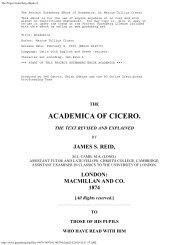From Farm House to the White House - 912 Freedom Library
From Farm House to the White House - 912 Freedom Library
From Farm House to the White House - 912 Freedom Library
You also want an ePaper? Increase the reach of your titles
YUMPU automatically turns print PDFs into web optimized ePapers that Google loves.
<strong>Farm</strong> <strong>House</strong> <strong>to</strong> <strong>the</strong> <strong>White</strong> <strong>House</strong>, by William M. Thayer 194<br />
"Not I, indeed, sir; I don't credit at all."<br />
"Ay, how do you make that out? Don't I see <strong>the</strong> poor people every day carrying away your bread, and yet<br />
paying you nothing?"<br />
"Pshaw! what of that? They will pay me all in a lump at last."<br />
"At last!" exclaimed <strong>the</strong> governor, "at <strong>the</strong> last day, I suppose. You think <strong>the</strong> Almighty will stand paymaster,<br />
and wipe off all your old scores for you at a dash."<br />
"Not by any means, squire. The poor bakers can't give such long credit; but I will tell you how we work <strong>the</strong><br />
matter. Washing<strong>to</strong>n directed me <strong>to</strong> supply <strong>the</strong>se poor people at his expense, and I do it. Believe me, squire, he<br />
has often, at <strong>the</strong> end of <strong>the</strong> season, paid me as much as eighty dollars, and that, <strong>to</strong>o, for poor creatures who did<br />
not know <strong>the</strong> hand that fed <strong>the</strong>m; for I had strict orders from him not <strong>to</strong> mention it <strong>to</strong> anybody."<br />
In a former chapter we learned <strong>the</strong> magnanimity of his conduct <strong>to</strong>wards one Payne, who knocked him down<br />
for a supposed insult. Mr. Payne relates that after <strong>the</strong> Revolution he called upon Washing<strong>to</strong>n at Mount<br />
Vernon.<br />
"As I drew near <strong>the</strong> house," he says, "I began <strong>to</strong> experience a rising fear lest he should call <strong>to</strong> mind <strong>the</strong> blow I<br />
had given him in former days. Washing<strong>to</strong>n met me at <strong>the</strong> door with a kind welcome, and conducted me in<strong>to</strong> an<br />
adjoining room where Mrs. Washing<strong>to</strong>n sat.<br />
"'Here, my dear,' said he, presenting me <strong>to</strong> his lady, 'here is <strong>the</strong> little man you have so often heard me talk of,<br />
and who, on a difference between us one day, had <strong>the</strong> resolution <strong>to</strong> knock me down, big as I am; I know you<br />
will honor him as he deserves, for I assure you he has <strong>the</strong> heart of a true Virginian.'"<br />
Mr. Payne adds: "He said this with an air which convinced me that his long familiarity with war had not<br />
robbed him of his nobleness of heart. And Mrs. Washing<strong>to</strong>n looked at him as if he appeared <strong>to</strong> her greater and<br />
lovelier than ever."<br />
The same industry distinguished him on his return <strong>to</strong> his farms, for which he was so well known before <strong>the</strong><br />
war. His rule was <strong>to</strong> rise at four o'clock and retire at nine. The forenoon was employed in labor and overseeing<br />
<strong>the</strong> work on his plantations. The presence of company did not interrupt his systematic methods. He would say<br />
<strong>to</strong> such:<br />
"Gentlemen, I must beg leave of absence this forenoon. Here are books, music, and amusements; consider<br />
yourselves at home, and be happy."<br />
But Washing<strong>to</strong>n was not allowed <strong>to</strong> remain long in private life. In 1787, a convention assembled in<br />
Philadelphia <strong>to</strong> form a confederacy of States. Washing<strong>to</strong>n was a member of that body, and was unanimously<br />
made its presiding officer. The convention sat four months, in which time <strong>the</strong> confederacy of States was<br />
consummated, called <strong>the</strong> United States, with <strong>the</strong> present Constitution essentially.<br />
This new order of things required <strong>the</strong> election of a president, and Washing<strong>to</strong>n was unanimously elected. He<br />
was inaugurated on <strong>the</strong> thirtieth day of April, 1789, in <strong>the</strong> city of New York, <strong>the</strong>n <strong>the</strong> seat of government. That<br />
<strong>the</strong> position was not one of his own seeking is quite evident from a letter which he wrote <strong>to</strong> General Knox:<br />
"My movements <strong>to</strong> <strong>the</strong> chair of government will be accompanied by feelings not unlike those of a culprit who<br />
is going <strong>to</strong> <strong>the</strong> place of his execution, so unwilling am I, in <strong>the</strong> evening of life, nearly consumed in public<br />
cares, <strong>to</strong> quit a peaceful abode for an ocean of difficulties, without <strong>the</strong> competency of political skill, abilities,<br />
and inclinations which are necessary <strong>to</strong> manage <strong>the</strong> helm."















